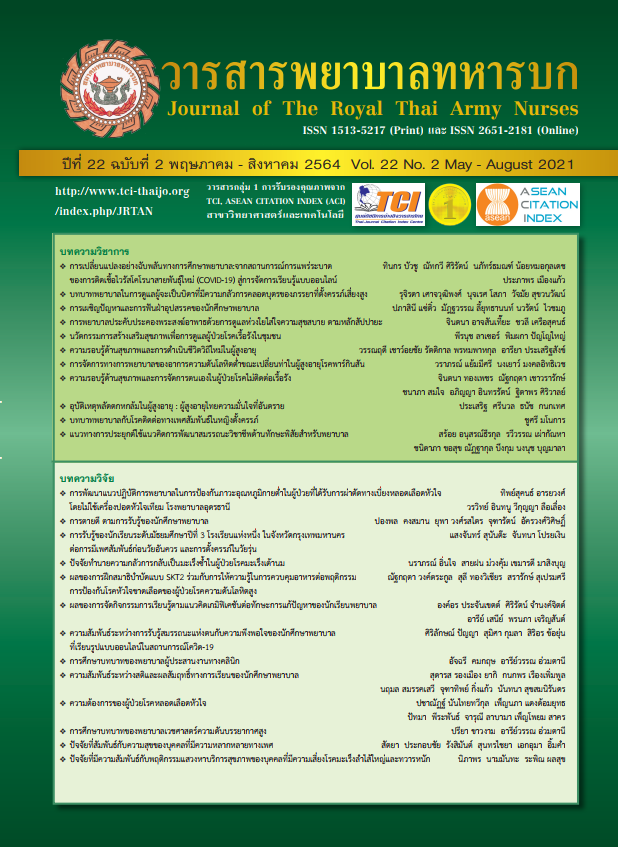The Role of Nurse in Take Care to Fear of Childbirth among Expectant Fathers Having High Risk Pregnant Wives
Keywords:
Fear of childbirth in expectant father, High risk pregnancyAbstract
Fear of childbirth in expectant father is feeling from negative predictions about wives pregnancy and birth. High risk pregnancy is the situation which may cause harm to wife and fetus, and it is unpredictable. The factors that cause fear of childbirth in the father are age, lack of experience, anxiety, self-esteem, and social support. So Midwife’s nurse should be health educator and counselor about symptoms and caregiving of women’s high risk pregnancy, and also be co-ordinator with interdisciplinary team for giving care and treatment appropriately to pregnant women. And be consultant about environmental modifies in both of health behavior and external environments that can help them perform daily activities appropriately. Moreover, Midwife should be researcher to learn about causes and how to do nursing care for the father and wife to have good physical health and mental health.
Downloads
References
Cunningham, F.G., Leveno, J. K., Bloom, L. S., Spong, Y. C., Dashe, S. J., Hoffman, L.B…, Casey, M. B. & Sheffield. S. J. Williams obstetrics (24 th ed.). Columbus, OH: Mc GrawHill; 2018.
Michael, E.L. The Role of the Father in Child Development (5th ed.). Canada, Published simultaneously; 2010.
Eriksson, C., Westman, G., &Hambreg, K. Content of childbirth-related fear in Swedishwomen and men: Analysis of an open-end question. Journal of Midwifery & Women’s health. 2006;51(2):112-118.
Eriksson, C., Salander, P., & Hamberg, K. Men’s experiences of intense fear related to childbirth investigated in a Swedish qualitative study. Journal of Men’s Health and Gender. 2007;4(4):409-418.
Sansiriphun, N. Emotional Experience of Expectant Fathers: Fear of Childbirth. Nursing Journal. 2009;40(3):121-128. (In Thai)
Keawya, P., Sansiriphun, N., & Baosoung, C. Fear of childbirth among first time expectant fathers and related factors. Nursing Journal. 2013;41(3):13-23. (In Thai)
Spielberger, C. D., &Sydeman, S. J. State-Trait anxieiety inventory and State-Trait anger expression inventory. In M. E. Marvish (Ed.). The use of phychological test for treatment planning and outcome assessment. 1994: 292-321.
Sansiriphun, N., Kantaruksa, K., Klunklin, A., Baosoung, C., & Jordan, P. Thai men becoming a first-time father. Nursing & Health Sciences. 2010;12(4):403-409. (In Thai)
Rosenberg, M. Society and the adolescent self-image (Rev. ed.). Princeton: Princeton University Press. 1989.
House, J. S. Work stress and social support. New Jersey: Prentice Hall. 1981.
Serçekuş. P. &Başkale, H. Effects of antenatal education on fear of childbirth, maternal self-efficacy and parental attachment. Midwifery. 2016;34:166-172.
Hanson, S.M.H., & Boyd, S.T. Family Health Care Nursing: Theory Practice, and Research. Philadelphia: F.A. Davis. 1996.
Poomsanguan, K. Health Empowerment: Nurses Important Role. Journal of The Royal Thai Army Nurses. 2014;15(3):86-90. (In Thai)
Downloads
Published
How to Cite
Issue
Section
License
บทความหรือข้อคิดเห็นใดใดที่ปรากฏในวารสารพยาบาลทหารบกเป็นวรรณกรรมของผู้เขียน ซึ่งบรรณาธิการหรือสมาคมพยาบาลทหารบก ไม่จำเป็นต้องเห็นด้วย
บทความที่ได้รับการตีพิมพ์เป็นลิขสิทธิ์ของวารสารพยาบาลทหารบก
The ideas and opinions expressed in the Journal of The Royal Thai Army Nurses are those of the authors and not necessarily those
of the editor or Royal Thai Army Nurses Association.






